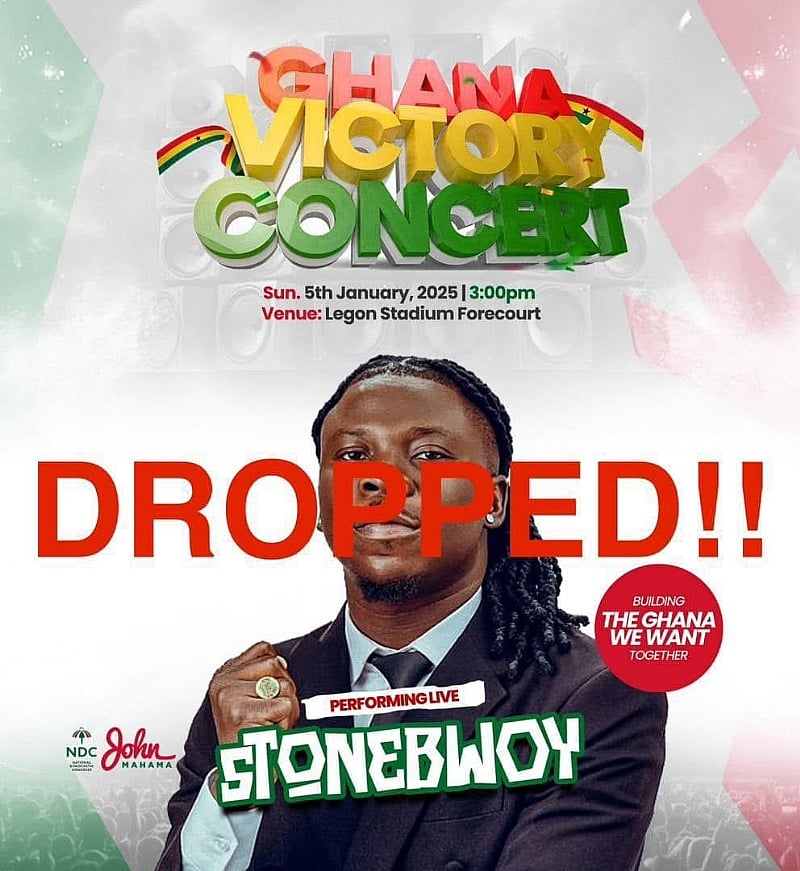The National Democratic Congress (NDC) found itself embroiled in a controversy surrounding the planned performance of renowned reggae/dancehall artist Stonebwoy at their Victory Concert, scheduled for January 5, 2025. Initially announced with much fanfare, Stonebwoy’s inclusion quickly sparked a firestorm of criticism from the party’s grassroots and youth supporters, forcing the organizers into a hasty and embarrassing retreat. The incident highlighted the complexities of navigating political affiliations and artistic expression, demonstrating the power of social media and the vocal influence of a dedicated political base. The controversy ultimately resulted in Stonebwoy’s removal from the concert lineup, a decision that underscores the delicate balancing act political parties face when engaging with popular culture.
The backlash against Stonebwoy’s planned performance originated from within the NDC’s core support base. While the specific reasons behind the initial outrage remain somewhat ambiguous, the swiftness and intensity of the negative reaction suggest underlying tensions and sensitivities within the party. The social media landscape quickly became a battleground, with the hashtag #DropStonebwoy rapidly gaining traction, reflecting a concerted effort by party loyalists to exert pressure on the concert organizers. This digital mobilization underscored the growing influence of online platforms in shaping public opinion and influencing political decisions, demonstrating how quickly a seemingly minor issue can escalate into a major controversy in the age of social media.
The NDC, caught off guard by the vehemence of the response, was forced to react swiftly to contain the growing dissent within its ranks. Recognizing the potential for further damage to party unity and image, the concert organizers issued a statement confirming Stonebwoy’s removal from the performance lineup. The statement attributed the decision to the concerns raised by the party’s grassroots, emphasizing their commitment to representing the will of their supporters. While acknowledging the inconvenience and potential embarrassment caused to Stonebwoy and his team, the organizers prioritized appeasing their base, highlighting the pragmatic calculations that often drive political decision-making.
The incident surrounding Stonebwoy’s rescinded invitation exposed the inherent challenges political parties face when seeking to bridge the gap between political messaging and popular culture. While inviting popular artists can broaden a party’s appeal and generate excitement, it also carries the risk of alienating segments of the support base who may hold different views or harbor pre-existing biases towards the artist. In this case, the NDC’s attempt to leverage Stonebwoy’s star power backfired, demonstrating the importance of carefully considering the potential ramifications of such collaborations and the need for thorough vetting to avoid alienating core supporters.
The Victory Concert, intended to celebrate the NDC’s recent electoral triumph, was ultimately overshadowed by the controversy surrounding Stonebwoy’s involvement. The incident served as a stark reminder of the power of a mobilized political base and the influence of social media in amplifying dissenting voices. While the organizers’ decision to remove Stonebwoy may have appeased the disgruntled supporters in the short term, it also raised questions about the party’s internal dynamics and its ability to manage public perception. The episode ultimately served as a valuable, albeit costly, lesson in the delicate art of political maneuvering and the importance of understanding the sensitivities of a diverse and often unpredictable electorate.
In conclusion, the Stonebwoy controversy underscores the delicate tightrope political parties walk when attempting to engage with popular culture. The incident highlights the power of a mobilized support base, the influence of social media in amplifying dissent, and the need for careful consideration when aligning with public figures. While the NDC’s decision to remove Stonebwoy may have mitigated immediate damage, it also exposed underlying tensions within the party and served as a reminder of the complexities inherent in navigating the intersection of politics and entertainment. The controversy offered a valuable, albeit public, lesson in political strategy and the importance of understanding the nuances of public sentiment in the digital age.














